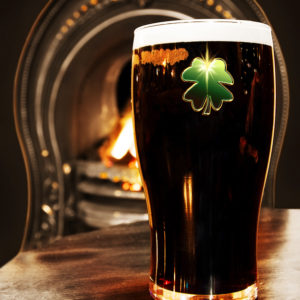In the 1951 movie “The Quiet Man”, John Wayne walked into Cohan’s Bar in the West of Ireland and asked for some of ‘that black beer.”
In 1984, President Ronald Reagan, searching for his Irish roots, drank a pint of Guinness in Ballyporeen County Tipperary. Most recently in 2011, President Barack Obama, in search of his white slave-owning relatives, could not resist downing a pint of Ireland’s best-known beer in the tiny village of Moneygall, home to 313 people.
There is no record of beer drinking exploits by President Kennedy in 1963 or President Nixon in 1970. The former because he probably preferred females and the latter’s Quaker background forbade public consumption.
It was an astonishing advertising coup for the Guinness brand but more importantly it copper-fastened the foreigner’s view that the Irish were a beer-swilling nation of charming layabouts.
Ireland is in total lockdown, overseen by a police force with powers unheard of, even in wartime. The over 70s have not been outside their front doors since March 15; the highways are empty of vehicles and the city centers lack only rolling tumbleweeds to be authentic ghost towns.
The big casualty is “the pub.” In a country where they had previously closed but twice a year, Good Friday and Christmas Day, they are empty of the music and conversation that was part of Ireland’s culture since the Great Famine of the 1840s.
The Irish have discovered the joys of drinking at home. The liquor store is considered an essential service on par with pharmacies and food stores and therefore open to cater to the thirsty citizens. Alcohol has replaced the toilet roll as the primary need of the nation.
The liquor stores have established new sales records and now routinely sell more before noon than they did previously in an entire day. This, despite the laws regarding social distancing, and the number of people on the premises at any one time.
Innovative buying options abound. Thanks to telephone and pay in advance, there is no need to leave the car and risk infection. Instead an employee places the order in the trunk and the transaction is safely completed.
Even better, if you live within four miles of a liquor store they will deliver for an extra charge of $10. Place an order for more than $150 and the delivery is free. There is a catch, the order must include six bottles of wine.
Unlike the leaders of the free world, Donald Trump and Boris Johnson, the Irish government is making no promises about reopening the economy and getting people back to work. Old age pensioners face the prospect of perhaps 100 days without interacting with another human or walking to the local store. There is an added complication: How to dispose of all the empty bottles!
The great unanswered question remains. Will the Irish pub survive?
I believe it undoubtedly will, it is just not a place to consume alcohol. It is a site for chat and music (“caint agus ceol” in the Gaelic). It is all about “goo Craic” — not to be confused with the deadly drug. Craic is another Gaelic word that has no meaning but embodies the joy of living in conjunction with alcohol that defines the Irish psyche.
The appeal of the Irish pub is so universal that even the uptight Eastern Europeans have discovered its virtues. You’ll find them in Vienna, Prague and Warsaw.
One thing Wayne, Reagan and Obama would miss in the current lockdown: Guinness on draft is unavailable in the liquor stores. Sadly, it is bottles only.
So the nation awaits the reopening of its pubs so that once it again it can feast its eyes on the glasses of the “black stuff, the ”Porther” or the “Pint.” Whatever name you call it by, tradition teaches us it can only be satisfactorily found in Ireland.

